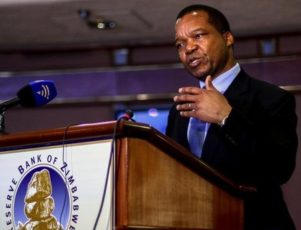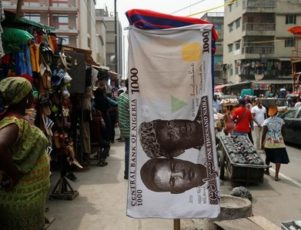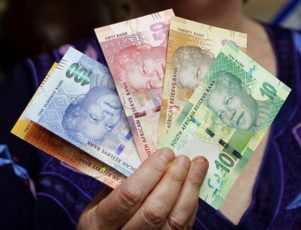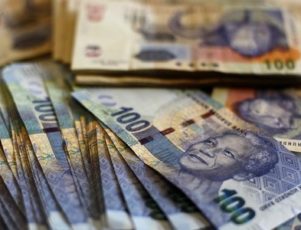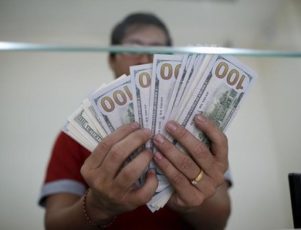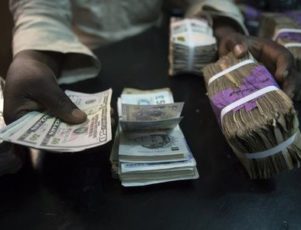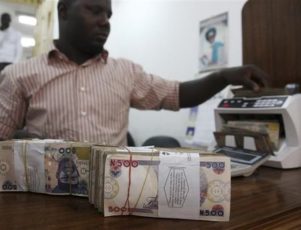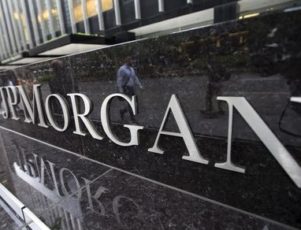LAGOS (Reuters) – JP Morgan will remove Nigeria from its Government Bond Index (GBI-EM) by the end of October, the bank said on Tuesday, after warning the government of Africa’s biggest economy that currency controls were making transactions too complicated.
The removal will force funds to sell Nigerian bonds, triggering potentially significant capital outflows and raising borrowing costs for the government.
Struggling with a plunge in vital oil revenue, Nigeria had imposed currency restrictions to defend the naira after the burning of dollar reserves failed to halt a slide.
The JP Morgan index tracks around $210 billion in assets under management.
Some bonds will be removed from the index by the end of September and the rest by the end of October, JP Morgan said.
The bank had warned Nigeria that to stay in the index, it would have to restore liquidity to its currency market in a way that allowed foreign investors tracking the index to conduct transactions with minimal hurdles.
Nigeria became the second African country after South Africa to be listed in JP Morgan’s emerging government bond index, in October 2012, after the central bank removed a requirement that foreign investors hold government bonds for a minimum of one year before exiting.
The index added Nigeria’s 2014, 2019, 2022 and 2024 bonds, giving Africa’s biggest economy a weight of 1.8 percent in the index.
“Foreign investors who track the GBI-EM series continue to face challenges and uncertainty while transacting in the naira due to the lack of a fully functional two-way FX market and limited transparency,” the bank said in a note.
The central bank had to devalue the naira and pegged it at a fixed rate against the dollar, turning trading into a one-way quote currency market whose lack of transparency upset investors and businesses.
The index provider said Nigeria would not be eligible for re-inclusion in the index for a minimum of 12 months. To get back in, it would have to establish a consistent record of satisfying the index inclusion criteria, such as a liquid currency market.
Nigeria’s Finance Ministry, central bank and Debt Management Office said in a statement they “strongly” disagreed with the index expulsion, saying that market liquidity was improving.
“While we would continue to ensure that there is liquidity and transparency in the market, we would like to note that the market for (government) bonds remains strong and active due … to diversity of the domestic investor base,” the statement said.
Traders told Reuters on Tuesday the central bank started rationing dollars to foreign investors last week.
Nigeria’s foreign reserves stood at $31 billion as of Sept. 7, down more than 21 percent from a year earlier, when they were $39.6 billion, the central bank said.
“Nigeria’s inclusion in the GBI-EM index was generally seen as a big step forward in its integration into global financial markets, opening the market to new investment and raising its profile worldwide. That will now be reversed,” said Alan Cameron, an economist at Exotix.
With Nigeria’s removal, countries such as Malaysia, Indonesia and Thailand have increased their weight by more 25 basis points as of Aug. 31, JP Morgan said in the note.
Foreign holdings of Nigerian government bonds stood below $2.75 billion, said Samir Gadio, the head of Africa strategy at Standard Chartered Bank. They had been around $8 billion in September 2014.
“This will initially trigger excess volatility in the market as exiting offshore accounts and onshore investors may push yields higher,” Gadio said. “A potential exclusion from the GBI-EM indices would make it more difficult to attract foreign portfolio flows in the future as Nigeria will need to rebuild its market credentials.”
By Chijioke Ohuocha (Reuters)
Read more

